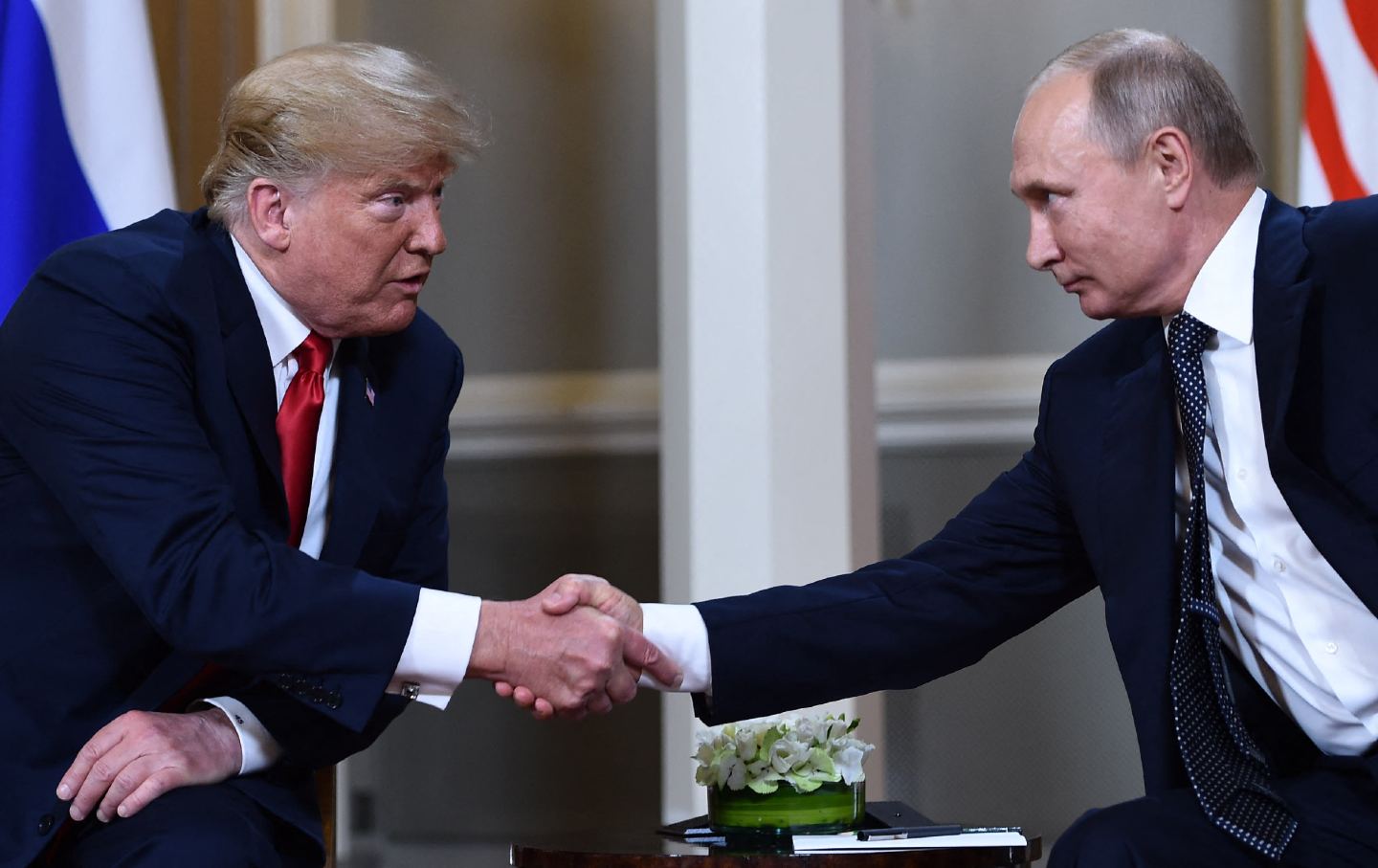Israeli Protesters Have Chosen a Side
Fearing for the remaining captives, the mass rallies that erupted across Israel were essentially demanding an end to the war—and Netanyahu knows it.
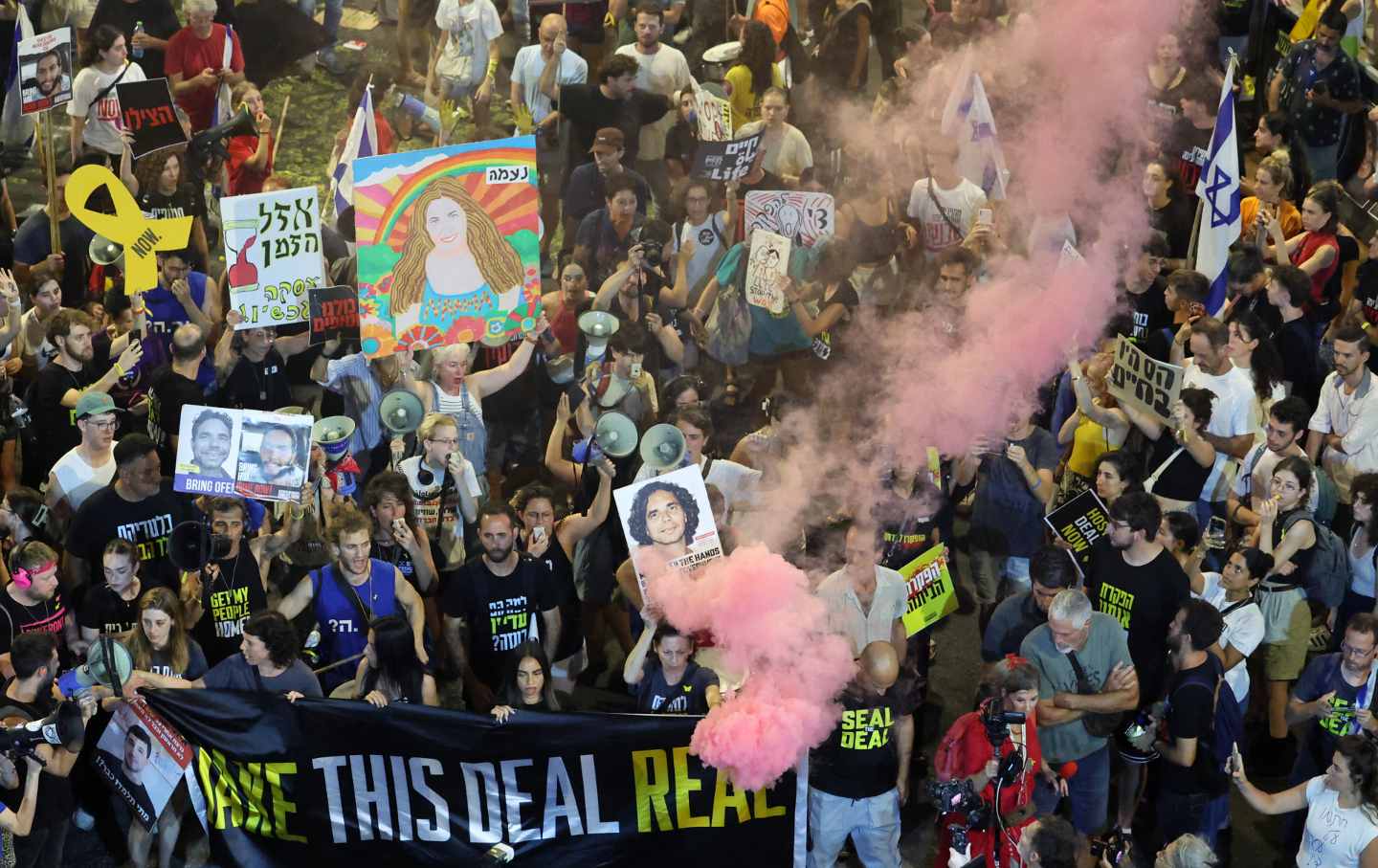
An anti-government Israeli protest in Tel Aviv on September 4, 2024.
(Jack Guez / AFP via Getty Images)For Israeli Prime Minister Benjamin Netanyahu, the mass protests that erupted across Israel on Sunday were all about overthrowing him and his government. Certainly, this goal was stated explicitly by almost every speaker who took to the stage at the main protest in Tel Aviv—where reportedly more than 300,000 Israelis flooded the streets after the army’s recovery of the bodies of six more hostages from Gaza, who had been executed shortly beforehand. Einav Zangauker, the mother of the hostage Matan, captured the mood of much of the public when she ordained Netanyahu with a new nickname: “The executioner.”
But the protests, which have continued into the week, also had a deeper, more subversive message that Netanyahu probably understood too. Without any of the speakers explicitly saying as much, Sunday’s demonstrations were for an end to the war.
To be clear, such a statement was not uttered from the stage. Nor was it seen on many placards, save for among the small pockets of left-wing protesters that formed the anti-occupation bloc. On the whole, opposition to the continuation of the war does not stem from moral concerns: There was no mention whatsoever of Israel’s genocidal actions in Gaza, nor was there a call for reconciliation or peace with the Palestinians. Rather, the protesters are preoccupied first and foremost with their fellow citizens held in Gaza, and demanding a “Deal Now” that would result in their release. Still, these calls have far-reaching significance.
Even in the event of a temporary ceasefire that would facilitate an initial hostage-prisoner exchange, such as the one envisaged by the deal currently on the table, Netanyahu is likely concerned that it would be extremely difficult to renew the war effort once the army has already withdrawn from the Philadelphi and Netzarim corridors and hundreds of thousands of Palestinians have been allowed to return to northern Gaza. Israeli society is exhausted; reservists are increasingly dodging their draft orders; Hamas is far from defeated; and by the end of the year, it will be difficult to re-instill the spirit of mobilization and the will to fight that was so strong immediately after October 7. As such, Netanyahu fears, even a short-term ceasefire would soon turn into a permanent one.
Israeli society has always been highly militaristic, with a strong tendency to rally behind the army in times of war. A mass anti-war demonstration while a war is still raging is thus an extraordinary event. The only parallel that comes to mind is the “demonstration of the 400,000” after the Sabra and Shatila massacre in 1982; yet even then the emphasis was more on the immoral way in which the war was being waged, rather than a protest against the war as a whole.
Netanyahu was probably aiming to stir up this militarism when he declared that Israeli troops must remain in the Philadelphi Corridor, even at the expense of a hostage deal. After all, it is hard to conceive of a goal more suited to the security discourse than cutting off Hamas’s “oxygen route,” through which it supposedly smuggles weapons into Gaza. But that argument didn’t satisfy the hundreds of thousands who protested on Sunday night.
Even on Saturday evening, before the bodies of the six hostages were recovered, Danny Elgarat, whose brother is still being held captive in Gaza, asserted: “You [Netanyahu] turned the Philadelphi Corridor into the mass grave of the hostages.” On Sunday evening, such messages were even stronger, and the audience cheered for them without reservation.
Many prominent figures on the Israeli right, from Netanyahu himself to the commentator Amit Segal, sought to redirect the public’s anger toward Hamas for executing six defenseless hostages, and away from Netanyahu and his government. But even this argument, which just a few days ago would have rallied a consensus in favor of “destroying Hamas,” no longer resonated.
“Netanyahu says that whoever murders hostages doesn’t want a deal,” Ilana Gritzewsky, a freed hostage and the wife of Matan Zangauker who is still being held in Gaza, said at the rally on Sunday. “But he keeps putting spokes in the wheels and refusing the deal. He’s murdering the hostages.”
Consciously or not, the hundreds of thousands who flooded the streets were an antidote to the poisonous security discourse that has been injected into Israeli society for the past 11 months. They don’t buy the talk of a “total victory” over Hamas, nor do they buy the claim—marketed as an iron truth by politicians and journalists of all inclinations—that “only military pressure will free the hostages.” The bodies of Hersh, Eden, Ori, Alex, Carmel, and Almog were the conclusive proof of the futility of such an argument.
Most importantly, they do not believe that the cessation of the war, at least at this stage, is a threat to their existence, contrary to what Netanyahu and his spokespeople have been claiming since the first days of the fighting. Quite the opposite: They perceive the continuation of the war as a direct threat to the lives of the hostages and, to a certain extent, their own. This is the subversive meaning of the call for a “Deal Now,” even if not everyone who voiced it understood its implication.
A Choice Between “Deal Now” and “Sacrifice Now”
The Israeli right still argues that it is not the Philadelphi Corridor that stands in the way of a deal but rather Hamas leader Yahya Sinwar and his impossible conditions. Most senior Israeli security analysts now reject this argument, insisting instead that it is the conditions set by Netanyahu, under pressure from Bezalel Smotrich and others on the far right of his government, that are sabotaging the agreement—even after Hamas surprised Israel by accepting a proposal that Israel itself had submitted.
But even if we accept the right’s narrative that Sinwar is the one preventing a deal, this is not what lies at the root of the dispute between those who see the Philadelphi Corridor as the bedrock of our existence and those who are willing to give it up. By voting in favor of Netanyahu’s proposal to keep hold of the Philadelphi Corridor, those cabinet members are saying that the death of the hostages, however painful and regrettable it may be, is a price that must be paid in pursuit of “total victory” over the enemy.
For Ben-Gvir and Smotrich, who suggested on October 7 “not to give the hostages significant consideration,” this victory means the elimination of Palestinians from the equation altogether: the erasure of their cities, and the expulsion of all or most of the Palestinian population living between the Jordan River and the Mediterranean Sea. For Netanyahu, it is not always clear whether “total victory” means his life’s mission of ensuring Jewish-Israeli dominance and preventing Palestinian independence, or simply his own political survival. Some would likely also be satisfied with Hamas’s surrender, and believe that this is still possible.
Ultimately, it comes down to a choice which is now abundantly, if belatedly, clear to all: continue the war indefinitely and endanger the lives of the hostages, or end the war in order to free them. The Israeli right chooses the former, while the hundreds of thousands taking to the streets don’t think any war goals are worth the blood of the hostages.
We saw similar numbers of protesters on the streets for much of last year, amid the controversy surrounding the government’s judicial overhaul. But that, at least, was still about laws, which can always change. Here we are talking about human lives: the sons, daughters, mothers, and fathers still being held in Hamas’s tunnels in Gaza.
In this sense, the recovery of the bodies of the six hostages casts serious doubt on the question of whether it is possible to speak of “Israeli society”—Jewish-Israeli, of course—as a cohesive body. The processes of disintegration and alienation are long-standing, and they gained momentum in the face of the judicial overhaul and the fierce struggle against it. Now, however, it is hard to see what connects those who are willing to sacrifice the hostages and those who see it as a crime or even a sin.
But while the “Sacrifice Now” camp has a clear plan for the future—a long-standing war and the transformation of Israel into a kind of modern Sparta—the “Deal Now” camp has no alternative vision, one where Israel could manage its relations with the Palestinians in any way other than violent confrontation. It is even careful not to call openly or decisively for a ceasefire or an end to the war, though that would be the fairly certain outcome of any such deal. The lack of such a vision and shared principles makes it very difficult to form a united front that could effect political change.
Many protesters returned home on Sunday with the feeling that, despite their impressive show of force, the chances of forcing the government to change course are slim. Indeed, under the current government, Israel increasingly resembles a dictatorial regime even with regard to its Jewish citizens, in which rulers do not need broad social support to govern; it is enough for them to rule by force, deploying the army against Palestinians and the police against Israeli citizens.
Popular
“swipe left below to view more authors”Swipe →Netanyahu’s news conference on Monday night strengthened this impression. Instead of showing any modicum of compassion to the masses who took to the streets the night before in agony and despair, he described those opposing his decision to remain in the Philadelphi Corridor—including his defense minister, Yoav Gallant, and the top brass in the army and security services—as helping Hamas. He vowed to remain in the Philadelphi Corridor practically forever, effectively blocking any chance for a ceasefire deal.
Still, we shouldn’t underestimate the subversive message that Sunday’s demonstrations and those that followed conveyed. During a raging war, they called for its cessation. In the face of a militaristic propaganda machine, they presented civil discourse. In the face of a government willing to sacrifice the hostages, they demonstrated a deeper social and national solidarity.
At this stage, it is difficult to foresee whether this broad mobilization will lead to political change; that will depend on many components unrelated to the protest movement, including American pressure. The challenge is enormous, immensely greater than the one facing the protest movements on Jerusalem’s Balfour Street in 2020 or Tel Aviv’s Kaplan Street in 2023: not only toppling a government and thwarting its legislative project but stopping the longest and bloodiest war in the history of the Israeli-Palestinian conflict. But a mass refusal to accept the narrative being fed from on high is an important first step—and that is exactly what we’re now seeing.
We cannot back down
We now confront a second Trump presidency.
There’s not a moment to lose. We must harness our fears, our grief, and yes, our anger, to resist the dangerous policies Donald Trump will unleash on our country. We rededicate ourselves to our role as journalists and writers of principle and conscience.
Today, we also steel ourselves for the fight ahead. It will demand a fearless spirit, an informed mind, wise analysis, and humane resistance. We face the enactment of Project 2025, a far-right supreme court, political authoritarianism, increasing inequality and record homelessness, a looming climate crisis, and conflicts abroad. The Nation will expose and propose, nurture investigative reporting, and stand together as a community to keep hope and possibility alive. The Nation’s work will continue—as it has in good and not-so-good times—to develop alternative ideas and visions, to deepen our mission of truth-telling and deep reporting, and to further solidarity in a nation divided.
Armed with a remarkable 160 years of bold, independent journalism, our mandate today remains the same as when abolitionists first founded The Nation—to uphold the principles of democracy and freedom, serve as a beacon through the darkest days of resistance, and to envision and struggle for a brighter future.
The day is dark, the forces arrayed are tenacious, but as the late Nation editorial board member Toni Morrison wrote “No! This is precisely the time when artists go to work. There is no time for despair, no place for self-pity, no need for silence, no room for fear. We speak, we write, we do language. That is how civilizations heal.”
I urge you to stand with The Nation and donate today.
Onwards,
Katrina vanden Heuvel
Editorial Director and Publisher, The Nation
More from The Nation

Warning From the Past Warning From the Past
In a new film, journalists confront a dictator.

The Case Against Joe Biden for Complicity in Genocide The Case Against Joe Biden for Complicity in Genocide
The ICC has applied for an arrest warrant for Benjamin Netanyahu. But Israel’s assault on Gaza has been made possible by US support.
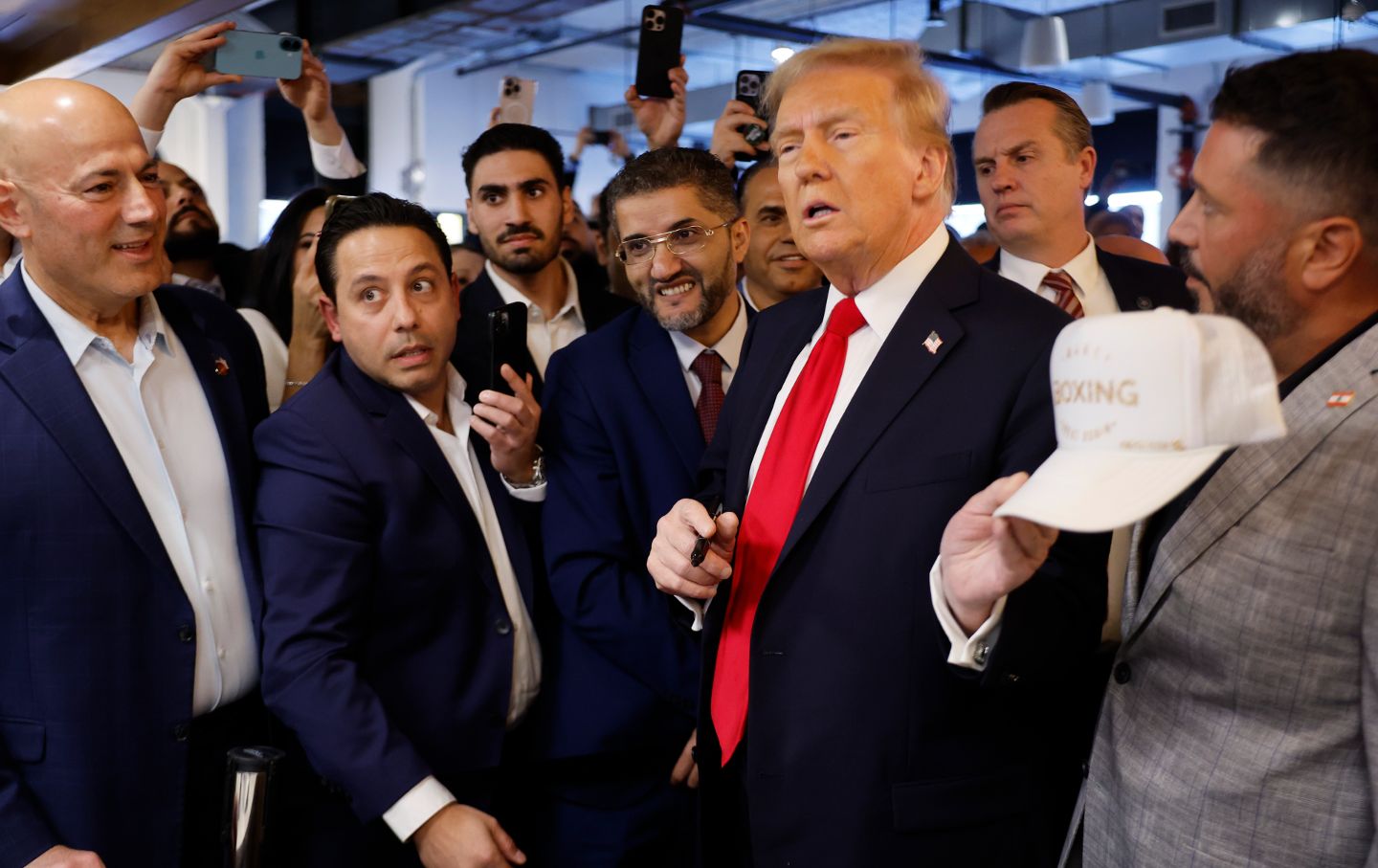
Gazans Heard Trump's Promises. Now They Want Him to Keep Them. Gazans Heard Trump's Promises. Now They Want Him to Keep Them.
Trump made a direct pitch to end the war on Gaza. The people still living there were listening.
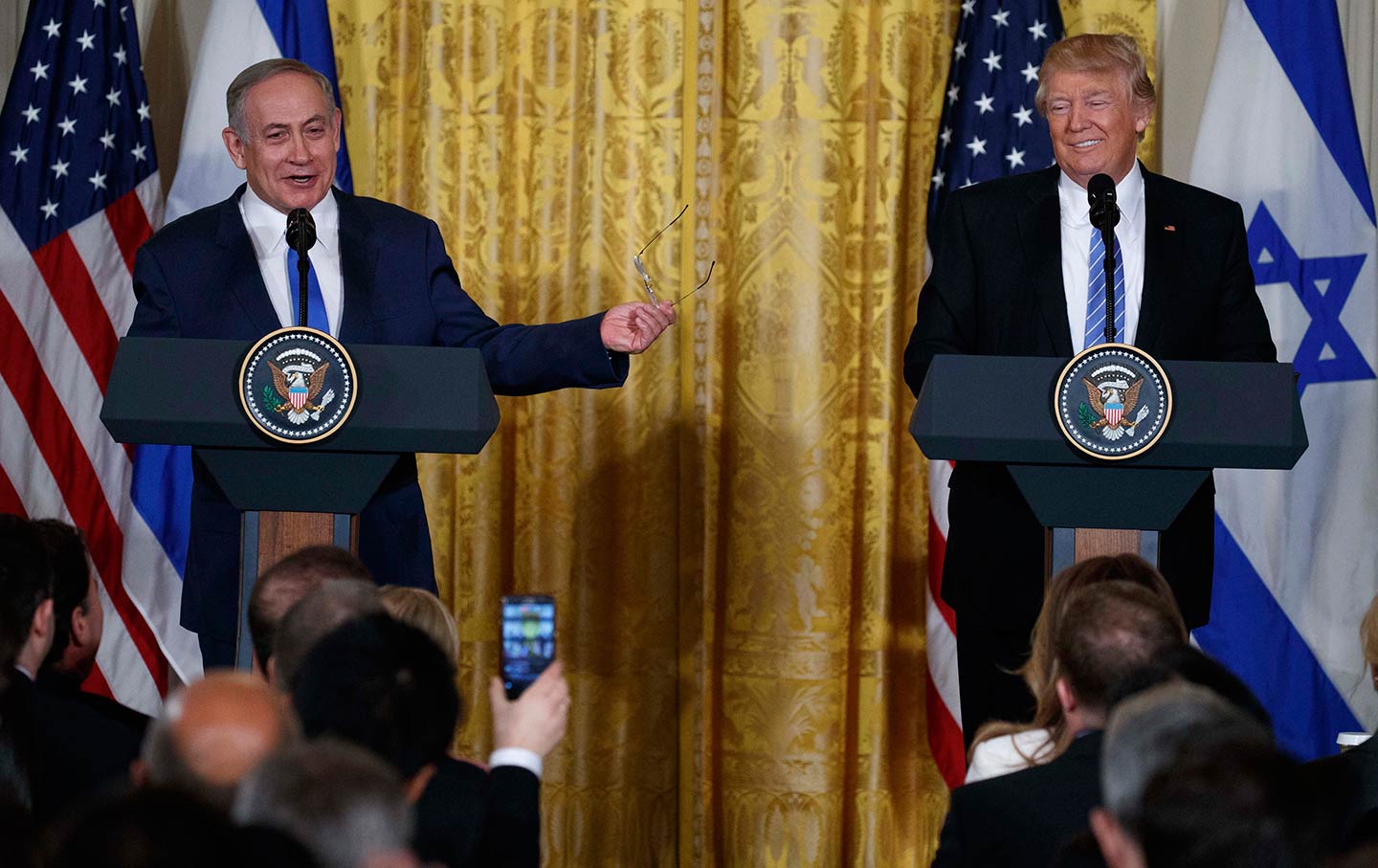
The Fallout of Biden’s Middle East Policy Is Now Trump’s Responsibility The Fallout of Biden’s Middle East Policy Is Now Trump’s Responsibility
In Trump’s hands, the country's diplomatic strategy in the Middle East can only get worse.
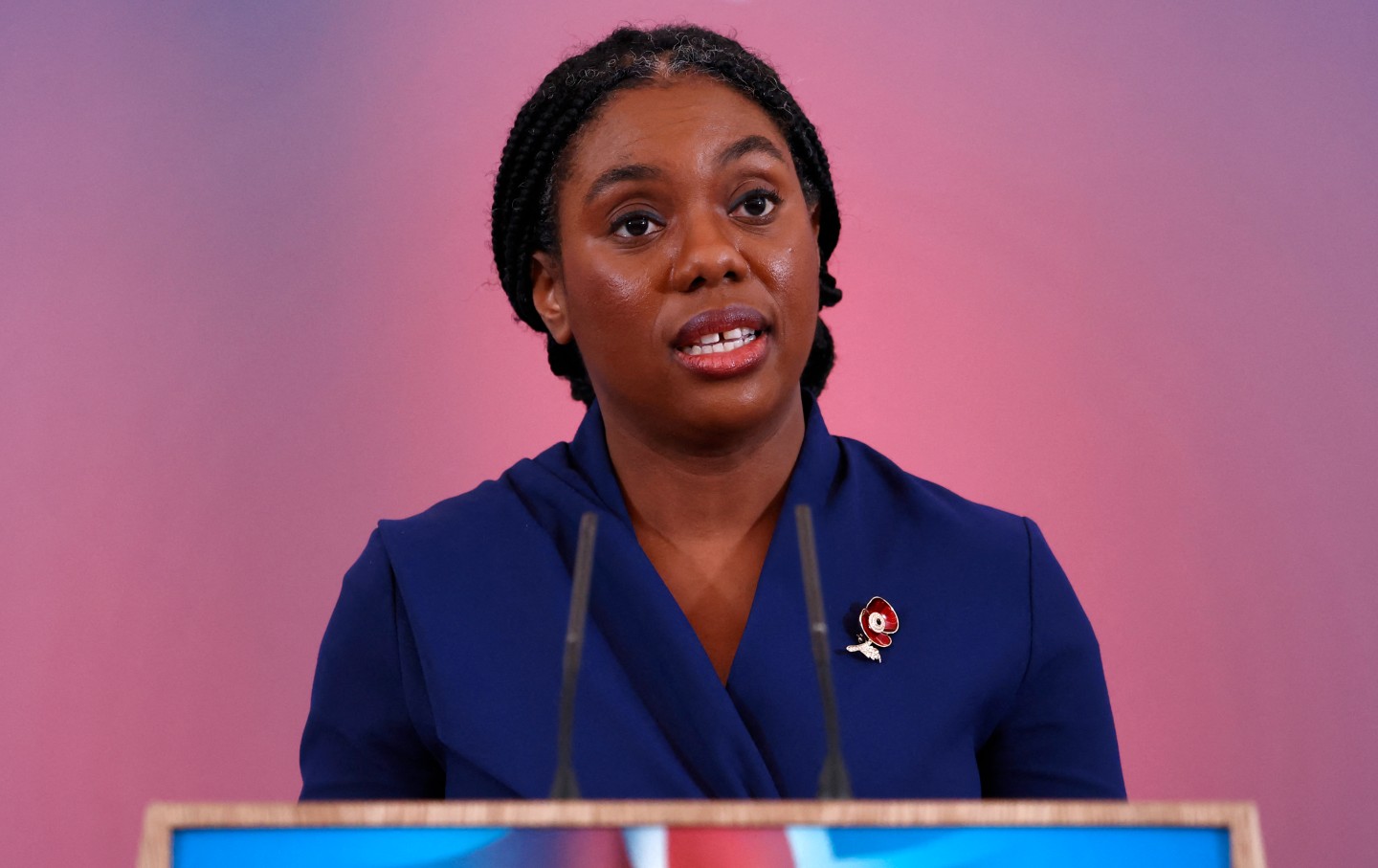
The New Face of British Conservatism is Black—and Female The New Face of British Conservatism is Black—and Female
The London-born daughter of Nigerian parents presides over the ruins of 14 years of Tory rule. Can her brand of nativism-lite bring the party out of the wilderness?

